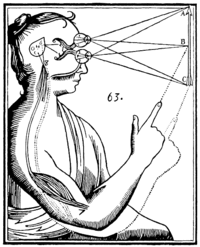
Back فرضية المحاكاة Arabic Hipòtesi de simulació Catalan بیردۆزی ھاوشێوەکردن CKB Simulationshypotesen Danish Simulationshypothese German Hipótesis de simulación Spanish فرضیه شبیهسازی Persian Hypothèse de simulation French השערת הסימולציה HE Hipotesis simulasi ID
| Part of a series on |
| Philosophy |
|---|

The simulation hypothesis proposes that what humans experience as the world is actually a simulated reality, such as a computer simulation in which humans themselves are constructs.[1][2] There has been much debate over this topic, ranging from philosophical discourse to practical applications in computing.
The simulation hypothesis, as formulated by Nick Bostrom,[3] is part of a long tradition of skeptical scenarios. It was presented by Bostrom as not merely a philosophical speculation, but an empirical claim with quantifiable probabilities. The hypothesis has received criticism from some physicists, such as Sabine Hossenfelder who has called it pseudoscience and religion,[4] and cosmologist George F. R. Ellis, who stated that "[the hypothesis] is totally impracticable from a technical viewpoint", and that "late-night pub discussion is not a viable theory".[5][6] Versions of the hypothesis have also been featured in science fiction, appearing as a central plot device in many stories and films, such as The Matrix.[7]
- ^ Manjoo, Farhad (2022-01-26). "Opinion | We Might Be in a Simulation. How Much Should That Worry Us?". The New York Times. ISSN 0362-4331. Retrieved 2022-02-10.
- ^ Paul Sutter (2022-01-21). "Do we live in a simulation? The problem with this mind-bending hypothesis". Space.com. Retrieved 2022-02-10.
- ^ Overbye, Dennis (17 January 2023). "Are We Living in a Computer Simulation, and Can We Hack It? – A popular cosmological theory holds that the cosmos runs on quantum codes. So how hard could it be to tweak the supreme algorithm?". The New York Times. Retrieved 17 January 2023.
- ^ Hossenfelder, Sabine (February 13, 2021). "The Simulation Hypothesis is Pseudoscience". BackReAction. Retrieved April 18, 2021.
- ^ Ellis, George (2012). "The multiverse: conjecture, proof, and science" (PDF). Retrieved April 18, 2021.
- ^ Ellis, George F. R. (2012). "Multiverses, Science, and Ultimate Causation". In Holder, Rodney D.; Mitton, Simon (eds.). Georges Lemaître: Life, Science and Legacy. Astrophysics and Space Science Library. Vol. 395. Berlin, Heidelberg: Springer. pp. 125–144. doi:10.1007/978-3-642-32254-9_11. ISBN 978-3-642-32253-2. Retrieved 2023-12-23.
- ^ "The Matrix: Are we living in a simulation?". BBC Science Focus Magazine. Retrieved 2022-02-10.
© MMXXIII Rich X Search. We shall prevail. All rights reserved. Rich X Search